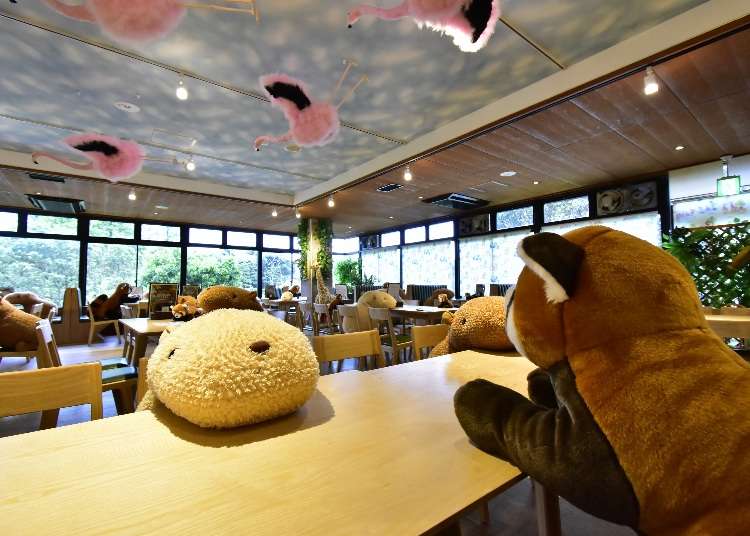
What COVID-19 measures are being taken at Japan's restaurants, hotels, transportation facilities and the like - and how are Japanese coping with "life with COVID-19?"
Based on interviews done by LIVE JAPAN and on official company announcements, we've put together the following to help gain insight into how Japan is facing the current crisis on an everyday basis.
* Information displayed is as of the time of article production. Prices and contents are subject to change.
* Information provided may change in response to the spread of the novel coronavirus.
* Please contact facility operators directly for the latest information.
- Table of Contents
-
- Restaurants: Partitions between neighbors; space sanitization; robot servers; plushies!?
- Hotels: Introduction of automatic check-in, thermography, and other measures
- Transportation: Spaces are disinfected; users wear masks and refrain from conversation
- Enjoy traveling safely and follow anti-COVID-19 measures
Restaurants: Partitions between neighbors; space sanitization; robot servers; plushies!?
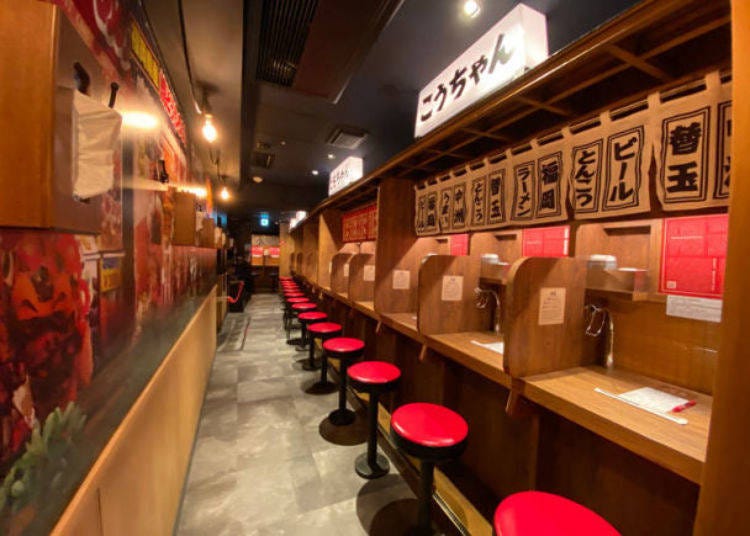
At restaurants, some of the most commonly seen coronavirus countermeasures include the introduction of partitions between adjacent seats; an air filtration/sterilization system that completely replaces the air several times an hour; and contactless payments. The appearance of hand sanitizers at the entrance of the store and around the cash register another new sight.
While some restaurants have added cardboard or plastic dividers between seats and tables that are sanitized after customers leave, others have been embracing the concept of "food space" and taking it to another level. Famous ramen chain Ichiran, for instance, introduced "Flavor Concentration Booths" before COVID-19, and with COVID-19 these booths have been very popular.
At Kamimura Ranch, an all-you-can-eat yakiniku restaurant opened by Watami in May 2020, all seats have partitions. In addition, orders are taken via touchpanel menus and delivered via an automated tray, similar to what you might find at a conveyor belt sushi restaurant.
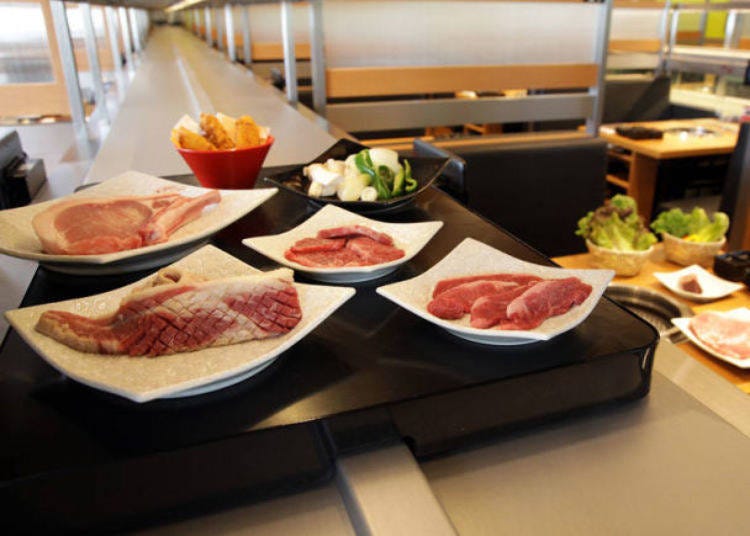
Another unique example that became a hot topic on Japanese social media was the approach toward social distancing taken at GIBBONTEI, a restaurant at Izu Shaboten Zoo in Shizuoka Prefecture. Here, stuffed animals such as capybaras and red pandas sit together with guests, making it seem as though they are enjoying time with a cute stuffed animal. This playful approach has a healing effect, helping reduce anxiety among guests while securing a healthy social distance.
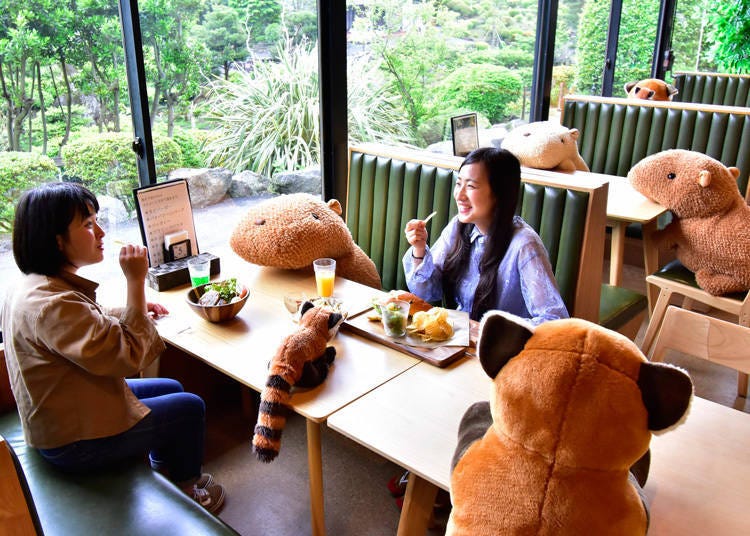
Mos Burger, a popular Japanese burger chain, introduced a robot called “OriHime” at its store in Osaki, Tokyo. From July 27 until the end of August, the shop plans to use the robots to take customer orders and help guide customers through the menu.
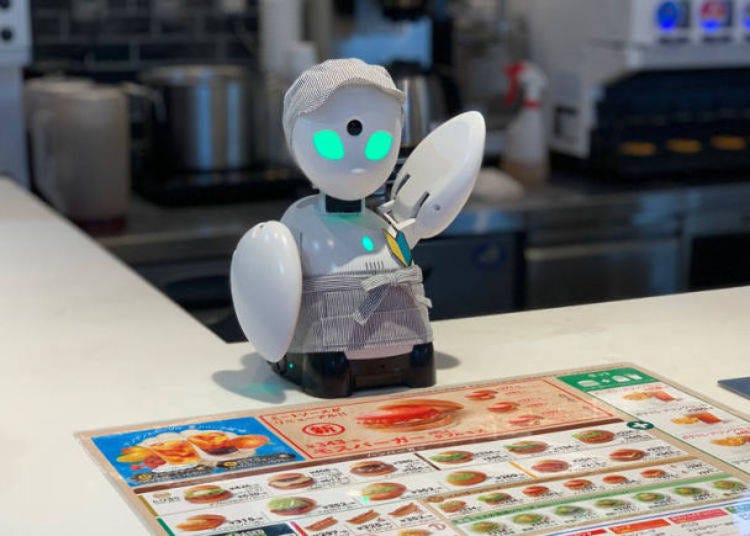
At a restaurant in the Takashimaya Department Store in Tamagawa, through the introduction of robot servers, you can even choose your order style, opting for "non-contact" (no mutual or direct contact between customers and store staff); or "non-face-to-face" (customer and store staff do not communicate face-to-face), creating a whole new style of service.
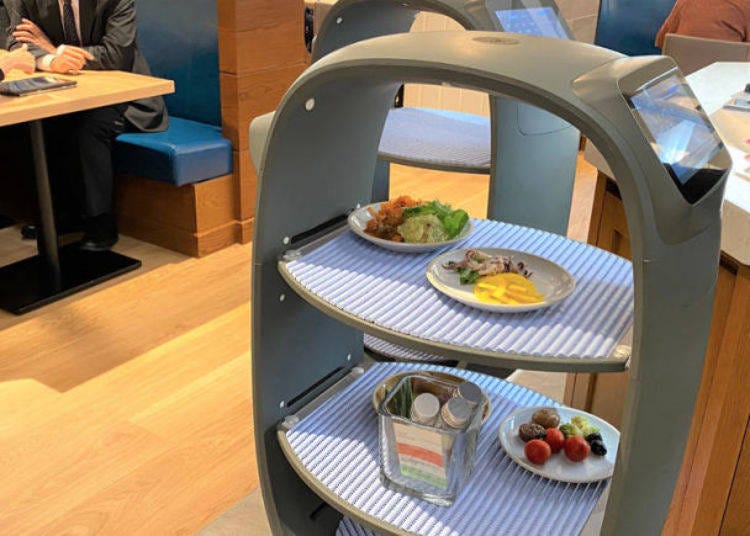
Also, as a way to achieve a contactless environment, restaurants are offering touchpanel menus and apps allowing guests to pre-order, make table reservations, and even check on how congested a restaurant is.
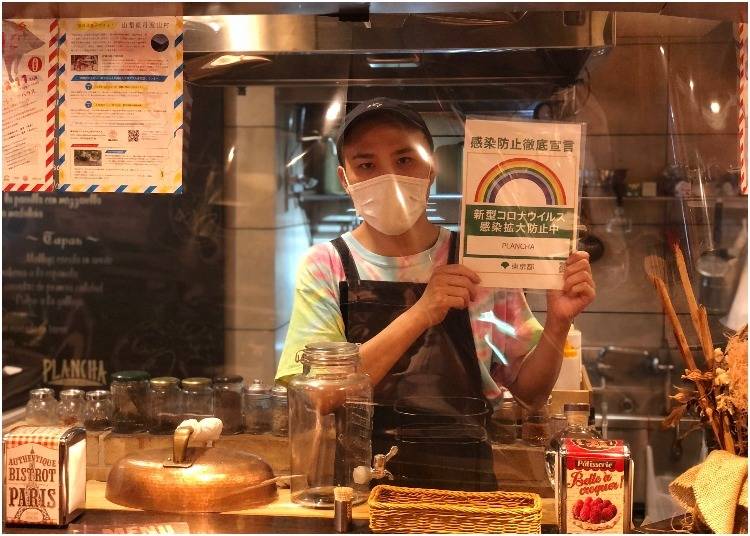
Tokyo Metropolitan Government has also introduced a series of specific measures that restaurants, bars, and 22 other types of businesses should be taking to prevent the spread of COVID-19. Businesses that pledge they are adhering to each of the guidelines can apply for a special COVID-19 safety sticker which they can display at their place of business. The stickers (and posters) include a QR code that directs to a webpage detailing what measures are in effect at that business.
Hotels: Introduction of automatic check-in, thermography, and other measures
Accommodations such as hotels and ryokan inns have requested that, prior to their stay, guests check their body temperature and refrain from visiting the facility if they feel unwell. Also, upon arrival, guests are often asked to use hand sanitizer; an additional temperature check is in place at some facilities.
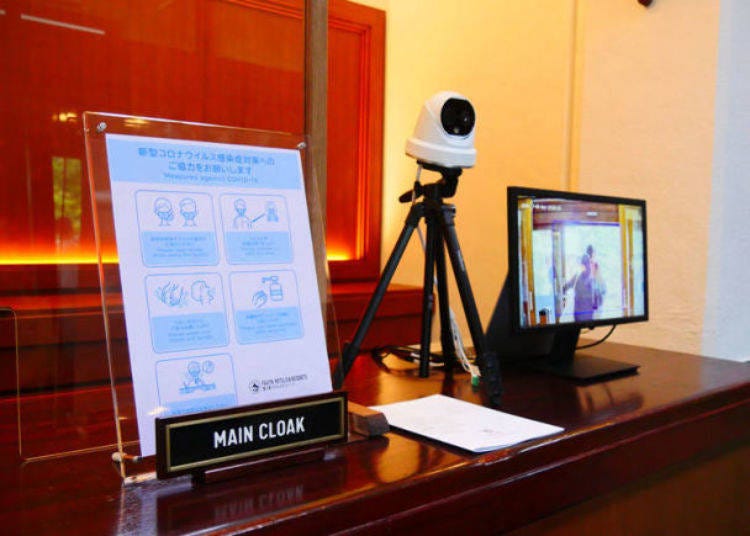
At the Fujiya Hotel, a classic hotel that was reopened on July 15, 2020, a thermography system to automatically measure guests' body temperature at the reception desk. Hand sanitizers are installed in multiple places in front of the elevator, restaurant entrance, and in guest rooms.
Hoshino Resort, a resort company, has declared on its website that it aims to take the highest level of measures against COVID-19, has paused guest check-ins at the reception desk at its HOSHINOYA luxury hotels and KAI hot spring inns. Instead, guests are taken directly to their rooms where check-in proceeds. In addition, automated check-in machines have been added at select hotels, such as OMO5 Tokyo Otsuka, to reduce personal contact with staff.
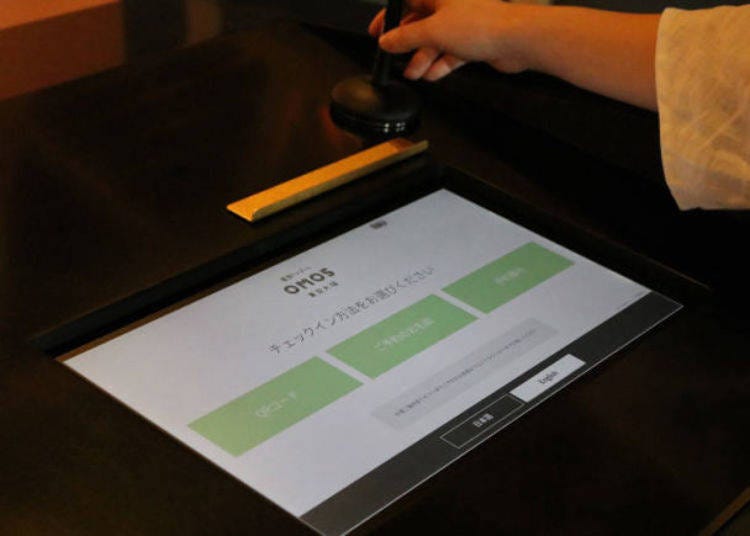
Also, Hoshino Resorts has introduced a system whereby guests can check their smartphones to see how congested the public baths are. At RISONARE Yatsugatake and RISONARE Tomamu, a similar system is in effect to let guests check how crowded the pools are.
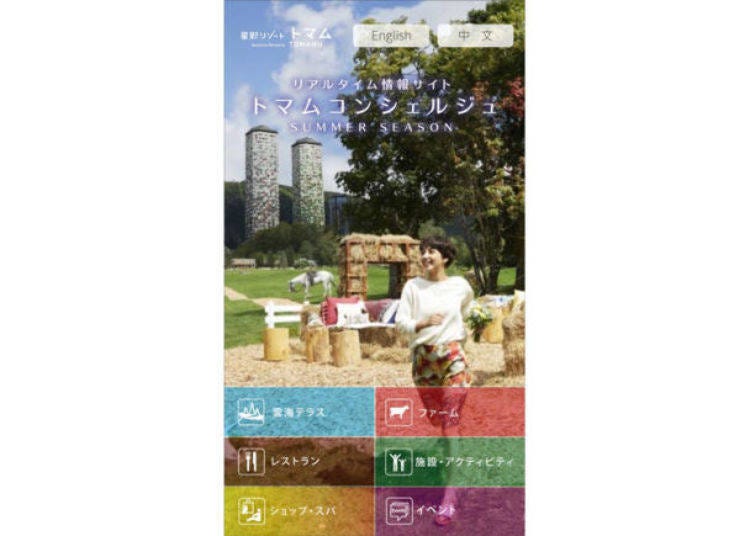
As for meals, crowding is being reduced at restaurants by staggering guests' meal times. In addition, they are shifting from a buffet-style format to a set meal menu or takeaway format. At KAI, HOSHINOYA Tokyo and HOSHINOYA Kyoto, food is also being served in half-private rooms.
When it comes to hotel meals, many guests look forward to the wide selection of foods on offer at the buffet, so facilities are looking to devise a system that balances health and safety with guests' expectations of meals.
At Hakone Yutowa, a ryokan near Gora Station in the hot springs town of Hakone, the buffet-style meals have been temporarily stopped; dinner has changed from a buffet to a set menu under which guests can request additional portions; and breakfast is changed from a buffet to a set menu.
Meanwhile, they have two buffet counters for side dishes, desserts, and drinks in the restaurant so that guests can quickly select some of their favorites in addition to the set meal.
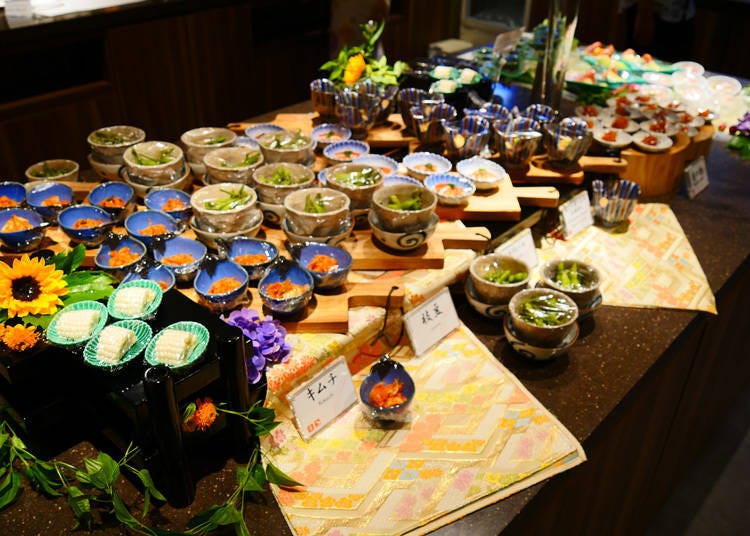
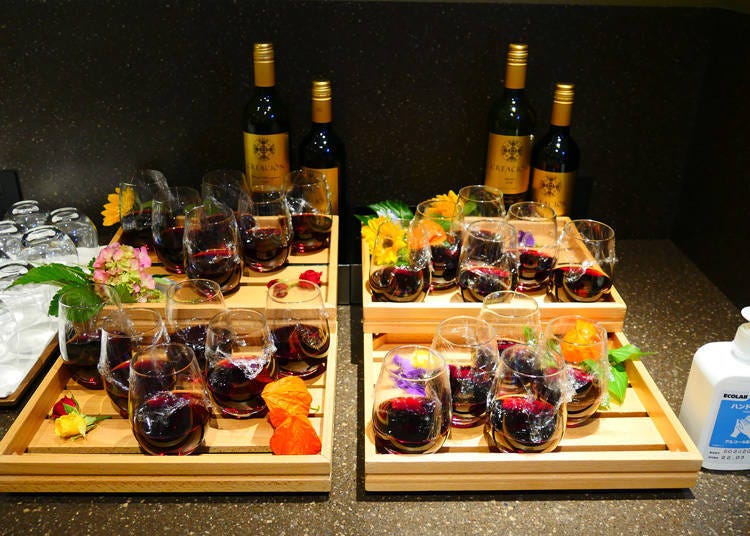
Transportation: Spaces are disinfected; users wear masks and refrain from conversation
As for public transport, the Ministry of Land, Infrastructure, Transport and Tourism (MLIT) and each railway operator are working together to take measures to ensure the safety of riders and employees. The Ministry of Land, Infrastructure, Transport and Tourism has released the following three requests for railway users.
(1) Wear a mask and keep conversations modest
(2) Understanding of and cooperation with in-vehicle ventilation
(3) Using vehicles during times in a manner to avoid congestion
Rail and bus operators have also shared measures they are putting in place against coronavirus, on their websites.
One example is WILLER EXPRESS, a company that operates a variety of express busses. It launched a uniquely configured seat space known as ReBorn, a three-row shell-type seat that lets guests have a secure private space, complete with space disinfection and deodorization. In addition, an Aeropure device is installed, which uses UV-C light to disinfect the space. Aeropure is currently being introduced in restaurants and other spaces as well.
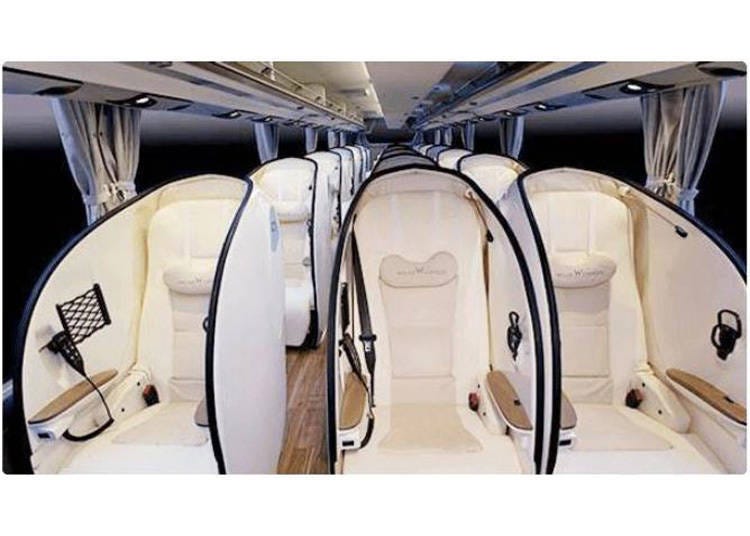
WILLER EXPRESS has also started letting guests see how full its buses are so that people can select seats and times that best fits their comfort zone.
Enjoy traveling safely and follow anti-COVID-19 measures
In addition to the standard practices of requesting (or requiring) guests' wearing a mask and using hand sanitizer before entering, many tourist facilities, amusement parks, theme parks, and other popular areas have additional measures in place.
For instance, Fujikyu Highland, an amusement park in Yamanashi Prefecture, has also asked that guests refrain from screaming or shouting even on its thrilling rides, demonstrated in a video of the park's president himself.
Also, social distancing measures are in effect at amusement parks and people are encouraged to avoid contact with others to the extent possible.
As for traveling in the age of coronavirus, the Travel Liaison Committee has also summarized guidelines that facilities and guests alike should mind in its "New Travel Etiquette," produced in cooperation with the Ministry of Land, Infrastructure, Transport and Tourism and the Japan Tourism Agency.
The New Travel Etiquette poster also shares a position that seems to be echoed in many other aspects of contemporary Japanese society: that each person's cooperation serves to protect everyone's enjoyable trip. This extends to many aspects of traveling, including the notion of selecting souvenirs with your eyes, not your hands.
Coping with coronavirus is still an evolving question throughout the world. Understanding what is expected of travelers and guests in Japan is an important planning step. Before traveling, be sure to check the websites of places you are interested in visiting, to see whether there are additional requests that will be made of guests.
Written by Shoko Kamiguchi
*Prices and options mentioned are subject to change.
*Unless stated otherwise, all prices include tax.
Popular Tours & Activitiess
Recommended places for you
-

Japan’s Shinkansen Is About to Change Travel in an Unexpected Way
by: Guest Contributor
-

These Tokyo Subway Stamps Are Free, Exclusive, and Weirdly Addictive
by: Guest Contributor
-
Ad

[Tokyo, Ueno] Journey to the Sacred Grounds of the Tokugawa Shoguns: Join the "EDO SHOGUN’S LEGACY TRAIL TOUR" – Where Special Access, Modern Art, and Digital Innovation Converge
by: Guest Contributor
-

Only in Tokyo? A Legendary Manga Artist's New Masterpiece Is Hiding Underground
by: Guest Contributor
-

This Winter, Godzilla Takes Over Haneda Airport
by: Guest Contributor
-

Jujutsu Kaisen Takes Over JR East With a Wrapped Shinkansen This Winter
by: Guest Contributor
Inspiration for Accommodations
-

Enjoy Mt. Fuji from the Comfort of Your Room! Recommended Ryokan with Mt. Fuji View
-

Stay Near the Cherry Blossoms! Hotels for Cherry Blossom Viewing in Tokyo
-

Family-Friendly Hotels with Free Shuttle to Disneyland: Convenient Access for a Magical Stay
-

Top Ranked Hakone Hotels with Mt. Fuji View: Enjoy Stunning Scenery from Your Private Space
-

Convenient Tokyo Hotels with Airport Shuttle: Ideal for Families and Heavy Luggage
-

Stunning Tokyo Tower View Hotels: Enjoy Spectacular Scenery from Your Private Space
-

Convenient Asakusa Hotels with Kitchens: Ideal for Extended Family Visits
-

Experience Luxury: Hakone's 10 Best Five-Star Accommodations
-

Enjoy Mt. Fuji Autumn Leaves! Top Hotels Near the Popular Autumn Leaves Corridor
-

Experience Hakone Fall Foliage from Your Room with Stunning Views
-

Does it Snow in Tokyo? How to Understand Japanese Weather Forecasts & What to Do When It Snows
-

Essential Tokyo: The Complete Guide to Ikebukuro Station
-

10 Important Japanese Phrases to Know Before You Enter a Japanese Convenience Store!
by: Teni Wada
-

Secrets to Shopping in Japan: Guide to Annual Sales in Japan & Where to Shop
by: Miyu Shimada
-

Pika-Perfect Holiday Gifts: Including the First Ever PUMA x Pokemon Collaboration!
by: Miyu Shimada
-

Kura Sushi is Changing the Face of Revolving Sushi - And There’s No Going Back
- #best ramen tokyo
- #what to buy in ameyoko
- #what to bring to japan
- #new years in tokyo
- #best izakaya shinjuku
- #things to do tokyo
- #japanese nail trends
- #what to do in odaiba
- #onsen tattoo friendly tokyo
- #daiso
- #best sushi ginza
- #japanese convenience store snacks
- #best yakiniku shibuya
- #japanese fashion culture
- #best japanese soft drinks


















